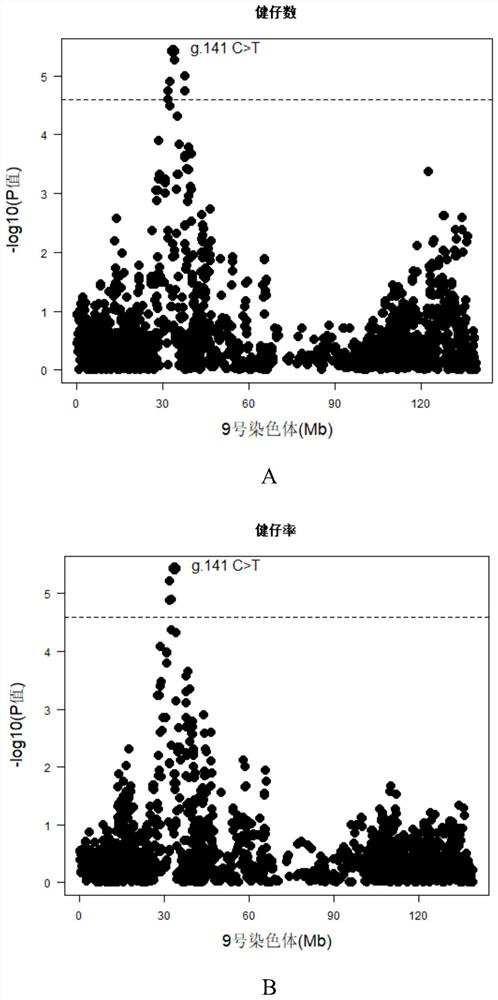SNP molecular marker located on pig chromosome 9 and related to healthy piglet number and healthy piglet rate and application of SNP molecular marker
A technology of molecular marker and number of healthy piglets, applied in the field of molecular biotechnology and molecular markers, to achieve the effect of increasing the number of healthy children and the rate of healthy children, increasing core competitiveness and increasing frequency
- Summary
- Abstract
- Description
- Claims
- Application Information
AI Technical Summary
Problems solved by technology
Method used
Image
Examples
Embodiment 1
[0029] (1) Experimental animals
[0030] The experimental pig group used in the present invention is 536 purebred Duroc pigs from the Breeding Pig Branch of Wen's Food Group Co., Ltd., which is the core group of the Breeding Pig Branch.
[0031] In this experiment, the Duroc pigs in this resource group were selected, and the pigs had free access to food and water, and the entire feeding method and feeding conditions were always consistent, which was a conventional method.
[0032] (2) Sample collection
[0033] The above-mentioned tail or ear tissues of piglets were collected and soaked in ethanol solution with a volume fraction of 75%, and stored in a -20°C refrigerator for later use.
[0034] (3) 50K SNP typing in the whole pig genome
[0035] Ear tissue or tail tissue was collected from each of the 536 Duroc pigs in the above-mentioned resource group, and the whole genome DNA was extracted by the standard phenol-chloroform method, and the DNA content of each sample was ac...
Embodiment 2
[0045] Example 2 Target DNA sequence amplification and sequencing
[0046] (1) Primer design
[0047] The DNA sequence of SEQ ID NO: 1 on pig chromosome 9 was downloaded from the Ensembl website (http: / / asia.ensembl.org / index.html), and primers were designed using the primer design software Oligo 7. The DNA sequences of the designed primers are as follows:
[0048] P001-F: 5'-TCCATATTCTCACAGACACCAGGT-3',
[0049] P002-R: 5'-TGTTGGGCAGTCTTAGGAATGACT-3';
[0050] (2) PCR amplification
[0051] Add 1 μL of DNA template, 3.4 μL of double distilled water, 5 μL of 2×Tag PCR StanMix with Loading Dye, and 0.3 μL of primers P001-F and P002-R into a 10 μL reaction system. The PCR reaction conditions were as follows: 5 minutes of pre-denaturation at 94°C, 35 cycles of denaturation at 94°C for 30 s, annealing at 57.6°C for 30 s, extension at 72°C for 45 s, and finally 5 min at 72°C.
[0052] (3) DNA sequence determination
[0053] DNA sequence sequencing identification: carried out ...
Embodiment 3
[0057] Example 3 SNP site g.141C>T effect analysis of molecular markers
[0058] According to Table 1, compared with the dominant allele type CC of the SNP site g.141C>T, compared with the inferior allele TT type, it can increase 1.71 healthy calves and improve the healthy calves rate by 13.28%. Therefore, through molecular marker-assisted selection or genomic selection, gradually selecting and retaining CC-type pigs in the population can significantly increase the frequency of the dominant allele C allele, which is beneficial to the healthy piglet size and health of sows. The improvement of litter rate can speed up the breeding and improvement process of pigs, and finally effectively improve the economic benefits of pig breeding.
PUM
 Login to View More
Login to View More Abstract
Description
Claims
Application Information
 Login to View More
Login to View More - R&D
- Intellectual Property
- Life Sciences
- Materials
- Tech Scout
- Unparalleled Data Quality
- Higher Quality Content
- 60% Fewer Hallucinations
Browse by: Latest US Patents, China's latest patents, Technical Efficacy Thesaurus, Application Domain, Technology Topic, Popular Technical Reports.
© 2025 PatSnap. All rights reserved.Legal|Privacy policy|Modern Slavery Act Transparency Statement|Sitemap|About US| Contact US: help@patsnap.com



